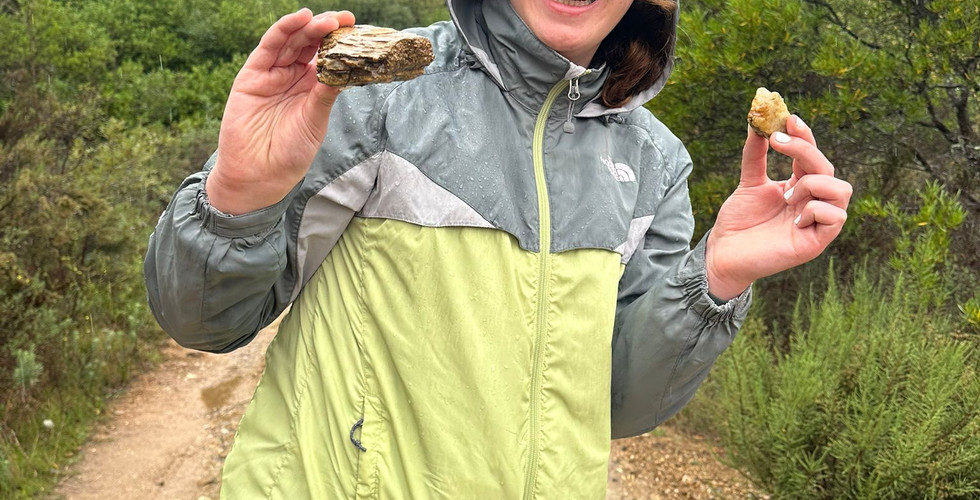Hope is Loud, Even if the Beat is Off
- mtbersagelbraley
- May 20, 2025
- 10 min read
By Heidi (Ethics, Culture, and Society, ’25)
After a morning filled with talk of community reconciliation and a lot of caffeine, we reconciled with our stomachs with a delicious meal of bobotie and rice with a side salad. Bobotie is a South African dish of minced meat with a baked egg topping. With an hour slot for lunch and a quick meal, people took advantage of this free time by taking naps, having some solo time, and in the case of Alessia and I, wandering around the Goedgedacht campus. We saw young olive trees, a lake, the chapel, looked at some quartz (Alessia wants to take it home), and bee houses in the garden. Regardless of the rain we enjoyed seeing just a little piece of the campus, tomorrow we will experience a tour of the farm and see more in depth what Goedgedacht has to offer.
Slideshow - Click > on photo to advance.
We had a quick tea snack before heading into the blue room (it’s not actually blue, but we’ll go with it). In the blue room we were greeted with several people employed by Goedgedacht and some youth from the community that are in programs offered at local centers.
They started with a couple of ice breakers, introducing themselves and how they’re feeling. In response, we attempted to do the same, learning that many of us are incapable of carrying a beat. Matthew has videos that I’m sure will be shared at some point in the future, so keep your eyes open to see us try to do this! We did a second ice breaker, this one goes like this in a call and response format.
“One day” “one day”
“My mama said” “my mama said”
“Themba” “Themba”
“Make me some porridge” “make me some porridge”
“By uuuuusing” “by uuuuuusing”
“Your right hand” “your right hand”
This repeated until we were all flailing around the room making porridge with both hands and feet.
We welcomed this change of pace from the seriousness of our morning discussions. We were now in the presence of peers and were able to discuss things perhaps a little more comfortably. It was great to see more young people on the farm and hear what they had to say.
From this group, we learned that many of them were leaders of POP Centers (Path Onto Prosperity) in the local area. There are six of these youth centers which aim to help young people succeed in many ways. They provide a safe welcoming environment to do homework, cultivate confidence and maturity, and build community amongst the local youth. The POP centers also provide mentorship programs, much like our own Big Brother Big Sister program. This is where young learners are matched with people aged 20-25 who act in an older sibling capacity to provide life skill lessons and accountability within their education.
We heard from a couple students who are a part of the Be Brave program, who Deon pushed to do just that when they shared how the program has impacted them. Students told us that this program has built their confidence and helped them find who they are in order to live a fulfilled life.
Tomorrow three of our own students will have the opportunity to join a meeting with this program to learn more about it.
The centers do more than just help youth; they also assist other community members with technology literacy, act as service centers for persons with disabilities and elderly citizens, and are a place of meeting for the community.
The group shared with us more about the centers and problems youth face in South Africa, specifically in the areas in which they live. They told us about issues with fighting, violence and how many people turn to drugs. Matthew then pushed us to share about our own experiences with issues in the States. We discussed things like gun violence in schools, the lack of national healthcare, and the uncertainty around current funding cuts for programs that support vulnerable populations in the U.S.
This recognition about issues in both countries is important to be told. Oftentimes, we may see only the positive things about a location. The beautiful scenery, delicious food, and welcoming communities. However, regardless of where you go in the world you are likely to find issues that plague a society. These issues are often not seen at the surface and require intentional recognition. As visitors to this nation, in order to appreciate and learn about where we are, we must be aware of the issues faced in communities and by people our own age.
To learn about how, at the end of the day, we are all alike, we ran through a series of activities. In these we had to find people with the same colored shoes, the same social media, match shoe sizes, and, lastly we had to organize by birthdate without talking. The leader of the activity, Heinelize Knoeson, told us that when we remove everything else in our lives, every single person has a birthdate. We all have an age and this is one similarity about ourselves regardless of anything else. This can act as a reminder of humanity. When playing the comparison game, or in the case of attempting to justify national atrocities, we are all, in our simplest form, just human. This activity allowed us to focus on a single similarity on our lives, even if it was just as simple as our favorite social media being TikTok.
In true ECAS-305 (our course number) fashion, we concluded our time together by singing Freedom is Coming. Thankfully, we have yet to be tested on our Shosholoza and Thula Sizwe proficiency. Those are still a work in progress, but I’m sure with time somebody somewhere will be just lucky enough to hear Gwen Mahoney and her backup singers!
As promised, the Goedgedacht experience has been much more relaxing than that of the first few days in the Cape Town city center. While we are incredibly grateful for all of the things we experienced and people we met, it’s nice to be able to slow down and hear the rain. The session concluded, and we were given another snack by the fabulous chefs of Goedgedacht, some fruit and pancakes. Students separated again for some varying quiet activities.
With quiet comes plenty of time for reflection. From today I have been given hope. From Alessia’s blog post about the success of one man’s story within the reconciliation process to hearing about how POP centers are working to provide the youth of today a better tomorrow. We are at the point in history where we are relying on younger generations to be the generation of change. Hearing success stories from the youth centers, of people who were once participants in the programs to leaders of the center themselves, we are left reflecting on our own role in our communities. Viterbo has provided me a community with foundational values that hope to support critical thinking about yourself, society, and how you interact with the world around you. We have a responsibility as humans to leave the earth better than we found it; not just physically but socially as well. To not just be a bystander in the world but to be an active participant in many areas of society is essential to the growth and development of it. We are lucky and incredibly grateful to be given the opportunity to reflect on our own community, communities across the world and be given the chance to interact with young people doing amazing things for their community.
For dinner, we were blessed with amazing food once again. We had lamb stew with rice and salad. A couple students were a little shy about the lamb, as it is not a food often eaten in the US, however our host Deon told us that in a debate between beef and lamb in South Africa, lamb is regarded as a favorite in the country. A hesitant student who had never had lamb before tried it and liked it! A win for South Africa!
After our meal we sat around the table with Deon and discussed more about South African history and the Truth and Reconciliation committee (TRC) and the process we learned about earlier in the morning.
Deon told us about TRC and how they focused on gross human rights issues in their meetings rather than the individual level of humiliated inequality that was experienced on the local daily life. Because of this, many people were used to these small acts so they weren’t seen as unacceptable. When we focus on the most terrible things that happen to people, often perpetrated by those in positions of power, people are able to shift away from responsibility and point blame at something higher than themselves. However, in reality just about every white South African took at least some part in apartheid, even if it was something like having black South Africans work in the kitchen of their homes. Because of this shift in responsibility, Deon tells us that many black South Africans see the TRC as unfinished business.
Despite its critical role of moving the country from apartheid to democracy, Deon noted that the TRC did not provide a robust mechanism for prosecution. Sometimes the TRC would declare that a testimony done during hearings was unsuitable and insufficient for granting amnesty to the perpetrator; however, efforts to prosecute faded as time went on and energy and resources faded. Therefore, essentially people who had not truly shown remorse were given political amnesty but still faced the social implications.
We then got to hear a little about current politics in South Africa. Deon tells us from his own perspective how people seem unhappy with how the government performs. The African National Congress (ANC) is the party that has been in power for a while; this is the party that Nelson Mandela was part of. However, this party is seen, by many, as corrupt and has been receiving less votes in recent elections, which in turn has resulted in a split of government control and power. According to Deon, this split is a good thing: he says if one party is too strong, people can become arrogant and there is a rise of mismanagement of the government and society as a whole.
A common topic of discussion with different people we have met over the past week has been about the current state of US-South Africa relations, especially with the involvement of Elon Musk, a South African, in US politics. The general consensus of the people we’ve talked to is that Musk gives South Africans a bad rap. With the recent refugee status given to 47 Afrikaners, this begs the question on how other places view South Africa. Compared to much of South Africa, simply the fact of being white provides safety from persecution in the country. Afrikaners face a lower degree of harm than black and people of color in the nation, however they are the ones being granted refugee status.
With the removal of USAID funding and other US funded programs, many of the institutions we have interacted with are facing some degree of struggle. From clinical trials at the university level to welfare programs at Scalabrini, the effects of the Trump administration are being felt deeply across the country. It is an interesting time to be traveling as an American to a country that is facing the impact of our political landscape. However, everywhere we go we are welcomed with open arms, given the opportunity to learn and further our own understanding of our place in the world coming from a more privileged society.
Deon rounds off our night with sharing his hopes for the future. From his interaction with students at the POP Centers, he says that he feels excited for young people in the incoming generations to enter politics. He highlights the fact that young black South Africans continually criticize politicians that have not done good for their communities in their actions in power.
I believe that as citizens we have the duty to criticize our government. As a graduating senior, I completed my capstone just a few weeks ago. I wrote on the development of social movements and what leads to their occurrence. In my capstone, I discussed the idea that disobedience of the law when you disagree is seen as a civic duty essential to the democratic process. If we don’t stand up, change doesn’t happen. As South Africans have displayed through their history, pushing back against oppressive structures and institutions is essential to the development of the society as a whole. Without this, this might never change. The past few days, talking to Jill, Craig, Horst, Fred, and Deon I am filled with the desire to have had these experiences prior to my capstone. However, hearing all of these things after I spent hours researching youth political engagement provides a deeper understanding of the unrest that must have been occurring internally for these experiences and results to have been created. Each person has provided invaluable inspiration, and the knowledge shared with us has given lessons that will inform how I approach society and the way I think for years to come.
Our evening came to a close after this dinner table conversation. The students headed back to our rooms in the Wildflowers Villa while Matthew and Sheryl headed to the Wild Geese quarters for bed!
While you may think this is the end of our night, truly it was just getting started. As Alessia and I sat down to write the blog with the hopes of enjoying a cup of rooibos tea (a popular South African tea), we discovered the outlets weren’t working. Not only this but they were also out in most students’ room. Therefore, we called our resident dad to the rescue (aka Matthew) who didn’t want to switch the breaker in case it ruined something and told us that it would probably be good if our phones died so we can connect more with each other. We argued back about the lack of alarms with Kaitlyn saying, “no Matthew we don’t bring analog alarm clocks to South Africa.” Thankfully, most people have one outlet working so do not fear we will awake tomorrow! Gwen and I are outlet-less but thankfully we are armed with portable chargers and dreams.
It was a long day of thoughtful discussion and connection on the Goedgedacht campus. Goedgedacht, which we’re still perfecting our pronunciation on, translates from Afrikaans to “Good Thought.” We have hope that over the coming days, we will continue to have good thoughts and conversations with each other and the people of this beautiful farm. Until next time our dear blog readers!





















What a fantastic, descriptive post, Heidi! You really bring the reader of these dispatches right into the experience with you at Goedgedacht (glad I don't have to pronounce it out loud!). The discussion, introspection, and person-to-person connections sound intense and revelatory, but there's also a certain lightness that comes through, buoying up the whole account. Thanks for sharing these eloquent and meaningful portraits from your journey in South Africa!